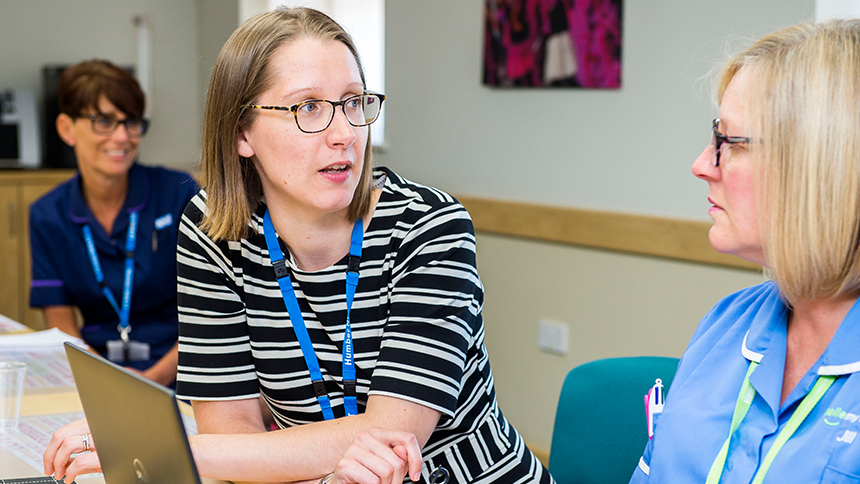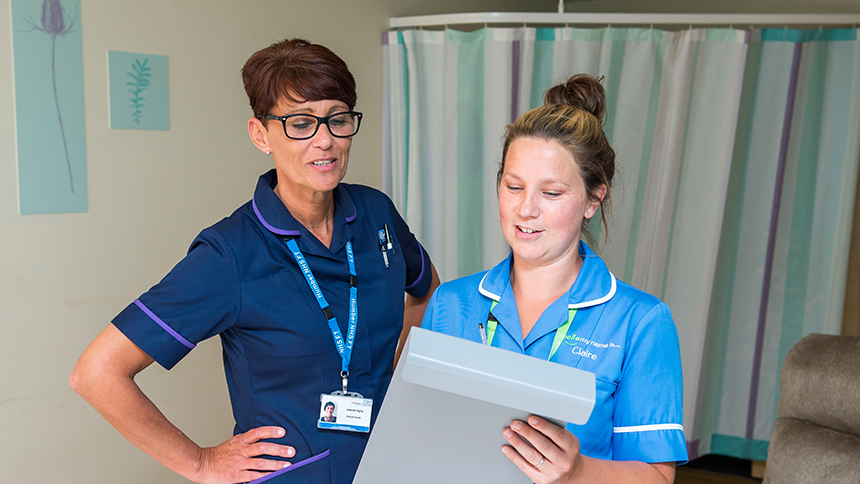Caring together: Hospice and mental health staff exchanging expertise
We report on a collaboration that's improving end of life care for people with dementia.

For the past six months, Dove House Hospice in Hull has been providing temporary residence to mental health patients who have dementia.
The nearby Maister Lodge mental health inpatient unit, which treats older people including those with dementia, has been housed within the hospice while its original home undergoes a major refurbishment.
The move has given staff the opportunity to exchange ideas and support each other, take part in training and presentation days together, and even swap shifts.
Increased confidence
The new way of working has allowed the hospice team to improve their understanding of dementia.
‘In palliative care a few years ago, dementia was seen as this scary thing – staff didn’t feel they had the skills,’ says Linda Johnson, Head of Clinical Services at Dove House.
‘But it’s about seeing how other people work, sharing skills and realising that it’s often not that different.’
The results have been significant.
‘The mental health team have given us additional knowledge, which has increased our confidence with patients,’ says Dr Kirsten Saharia, a Consultant in Palliative Medicine.
‘Hospice staff helped with questions like, “When can you not do any more to keep someone alive?”’ says Matthew.
Meanwhile, Maister Lodge staff have gained valuable insights into end of life care.
‘We have very few end of life patients at Maister Lodge and you can be worried about whether you’re doing the right thing for them, but the experience of Dove House staff put me at ease,’ says Matthew Fisher, a Registered Mental Health Nurse.
‘They helped with questions like, “When can you not do any more to keep someone alive?”’
Dove House staff also gave their mental health colleagues advice and support on medication, including specific guidance on using a syringe driver instead of repeated injections, which can cause distress.
‘We’ve been back and forth supporting them with information – it’s been a very enlightening time for both sides,’ says Jill Monday, a sister at Dove House, who adds that the care has been very patient centred.
Sometimes, all that’s required is a bit of clarification or reassurance.
‘The patients are very settled in a peaceful environment on the unit, so now that we’ve got some really good staff relationships we can be a safety net,’ says Jo Gillespie, a Senior Sister at the hospice.
Remarkable job
The joint care on offer has been praised by the families of patients.
John Sandell’s partner Julianna, who had dementia with Lewy bodies, stayed at Maister Lodge for five weeks before transferring to Dove House’s hospice care, where she died aged 66.
‘I didn’t know what to expect, so I was relieved that it was a nice place,’ says John.
‘Staff from Maister Lodge were with Julie every day after she moved, to keep that continuity so she didn’t feel it was all strangers.’
‘The staff were 110% and did a remarkable job – it made me want to go and work for them,' says John.
‘I thought it was absolutely wonderful how they kept everything going like that.’
‘The staff were 110% and did a remarkable job – it made me want to go and work for them.’
John’s son, Julian, saw excellent examples of joined-up working during Julianna’s care.
‘When Mum was very angry and aggressive, the Maister Lodge staff helped with the mental health aspect while the hospice monitored the palliative care,’ he says.
‘Then the mental health staff backed off when they were no longer required, after checking with Dad.’
Expert care
Another patient, Neil Jackman, died at Maister Lodge earlier this year. Aged 73, he had a diagnosis of Alzheimer’s but was also believed to have vascular dementia.
‘The care at Maister Lodge was tailored to his needs, it was outstanding,’ says his daughter Kelly.
‘It didn’t feel like a hospital ward – it wasn’t clinical. It was just everything he required.’
Kelly and her siblings didn’t want to disrupt Neil by moving him to the hospice side, so during the last 10 days of his life Dove House staff came across to support him, Kelly and the mental health team.
They took the lead on pain relief and end of life medication.
‘They had that knowledge and were able to explain things step by step,’ says Kelly. ‘We had that expert care on hand. I couldn’t thank both sides enough.’

Dying well
Both services recognise the importance of high quality end of life care for people with dementia.
‘There’s such a lot of focus on having a good life, but perhaps there still isn't enough focus on dying well with dementia,’ says Jo Inglis, a Charge Nurse at Maister Lodge.
‘Patients here have had good deaths.’
Anna Wolkowski, Chief Executive of Dove House, says the hospice is simply extending its welcome.
‘Dementia is a life-limiting condition, so these are our patients,’ she says.
As they prepare for the move back, the teams are making plans to continue joint training sessions and presentation days, and to set up ongoing mentoring and mutual support.
‘At first we weren’t even sure if we could discuss our patients with Dove House staff,’ says Emma Wolverson, a Clinical Psychologist at Maister Lodge.
‘On paper it seems ridiculous to bring two highly stigmatised services together, but it has made such a difference for patients and families.’

